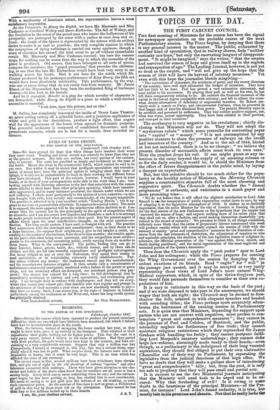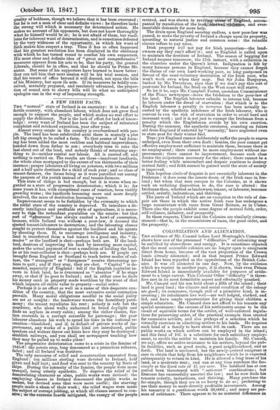TOPICS OF THE DAY.
THE FIRST CABINET COUNCIL.
THE first meeting of Ministers for the season has been the signal for newspaper speculation on the probable course of the next Parliamentary session. The Times begins, by denying that there is any general interest in the matter. The public, exhausted by another kind of speculation, that in railway shares, feels "neither curiosity nor hope," but only the enervating languor of disappoint.. ment. " It might be imagined," says the writer, " that the empire had survived the season of hope and given itself up to the regrets and retrospection of age." The Leading Journal, however, is not yet so dead as the empire, and "will not . give up the hope that the season of 1848 will have its harvest of salutary measures." Yet even with this hope the journalist blends misgiving— "The conversions of statesmen, the accidents of party, and the recent disasters of the country, have well nigh exhausted the budget of invention. They have left but little to be done. Peel has proved a very exhaustive statesman, and most unfair to his successors. By playing their part as well as his own, he has left them comparatively nothing to do. He reduced the financial resources of the nation to the lowest degree compatible with solvency, and left to others the some- what dreary alternatives of deficiency or augmented taxation. Sir Robert cer- tainly stole a march on Party, and circumvented Fortune, when he procured in that happy nick of time his dismissal from power. The present Ministry came in by accident, and governed by sufferance. They had neither positive support, nor, what was worse, actual opportunity. They have been cabined in their position, and cramped in their resources."
The soothsayer is very negative in his revelations ; chiefly dis- closing what Ministers will not do. They will not adopt the " mysterious cabala" which some prescribe for converting paper into " capital" or " money." " It is not contemplated by any positive measure to abate the pressure of railways on the credit and resources of the country." And as to the act of 1844, hinted at but not mentioned, there is to be no change : " we believe the present disorder of mercantile affairs must work its own cure." Here the prophet drops his veil. If one might guess at any in- tention in the essay beyond the supply of an amusing column or so for the daily reader, it would be, to shield the Ministers from the effect of future disappointment in the public mind, by laying a damper on expectation.
But, lest this sedative should be too much either for the popu- larity or the healthy action of Ministers, the Morning Chronicle supplies a counteractive stimulus full of the most cheering and suggestive spirit. The Chronicle doubts whether the " dismal programme" is authentic, and vaticinates in a much gayer and more promising tone-
" We do not beheve that it will afford the slightest satisfaction to Lord John Russell to see the temperature of public expectation cooled down to zero, by way of adapting it to the legislative atmosphere of 1848. It strikes us as decidedly improbable, that the noble Member for the city of London is framing his policy for the first session of the new Parliament on the hypothesis that the empire has 'survived the season of hope,' and expects nothing more of its rulers than that they shall rub on, after a fashion, and avoid making themselves shamefully pro- minent in the record of calamity.' We presume to think it, all things considered, infinitely more likely that the series of preparatory labours commenced this week will produce results which will eventually connect the session of 1848 with the memory of sundry great and comprehensive' measures for the liberation of com- merce from the last remnants of restriction, the adjustment of taxation on wise and equitable principles, the abolition of the last legislative traces of religious in- tolerance, the effectual prosecution of the war against filth, fever, stench, and death-dealing pestilence,' and the social regeneration of the most neglected and wretched portion of the Queen's dominions.
Thus does the Chronicle apply the " proh pudor " spur to Lord John and his colleagues; while the Times prepares for coaxing the Whig Government over the session by damping the too ardent exactions of its friends. Read " ought" for " will" in the passage just quoted, and it may be accepted as veryjustly representing those views of Lord John's more earnest Whig- Radical supporters, which, in spite of the thrice-forgiven past, they would fain persuade themselves to consider as their own ex- pectations of him. It is easy to vaticinate in this way on the basis of the past and if we were disposed to take part in the amusement, we should wager that both are right : the Chronicle may be deemed to fore- shadow the bills, ushered in with eloquent speeches and headed with sounding titles; the Times perhaps more accurately adum- brates the barrenness of the ensuing session in Parliamentary acts. It is quite true that Ministers, depending for support upon parties who are not content with negatives, must profess to con- template "great and comprehensive measures"; they cannot in the presence of Peel and Cobden, of Bentinck, and the public, ostensibly neglect the furtherance of free trade; they cannot maintain religious restrictions which they reproached Sir James Graham with handling too feebly ; they cannot postpone fulfil- ling Lord Morpeth's sanatory undertakings ; they cannot defer large law-reforms, alarmingly made ready to their hands,—even though, as a preliminary to the indulgence of their long vaunted aspirations, they should feel obliged to put their own obstructive Chancellor out of their way in Parliament, by separating the legislative from the judicial functions of that high office. We have no doubt that they will make a gallant show of introducing "great and comprehensive " bills ; but, from the past, it is only too safe to prophesy that they will pass small and partial acts.
It is curious to see the two Ministerial journals anticipating that the Ministry will need both to be urged and to be ex- cused. Why that foreboding of evil ? Is it owing to some doubt in the heartiness of the principal Ministers—of the Pre- mier, for instance? Lord Johns famed audacity, it is true, has mostly lain in his promises and threats. Not that he,really lacks thf quality of boldness, though we believe that it has been overrated ; but he is not a man of clear and definite views : he therefore lacks the strong will which is necessary for determined action. He makes no account of his opponents, but does not know thoroughly what he himself would be at; he is not afraid of them, but vacil lates for inherent want of determination, and is sometimes defeated by the very wideness of the opportunity, in which his want of faith makes him suspect a trap. Thus it has so often happened that his greatest resolution has been displayed in the obstinacy with which he has turned round to combat his own supporters. His most clear and definite idea of "great and comprehensive" measures appears from his acts to be, that his party, the genteel Liberals, should be in office, and that he should be Prime Mi- nister. But some of his supporters have learned to know better: they can tell him that next session will be his trial session, and that his tenure of office beyond it will depend, not upon the bills of his Ministry, but upon its acts. If its measures be boldly con- ceived, maturely prepared, and resolutely advanced, the propor-. tion of sound acts to showy bills will do what no anticipated apologies can in the way of imparting strength.



























 Previous page
Previous page